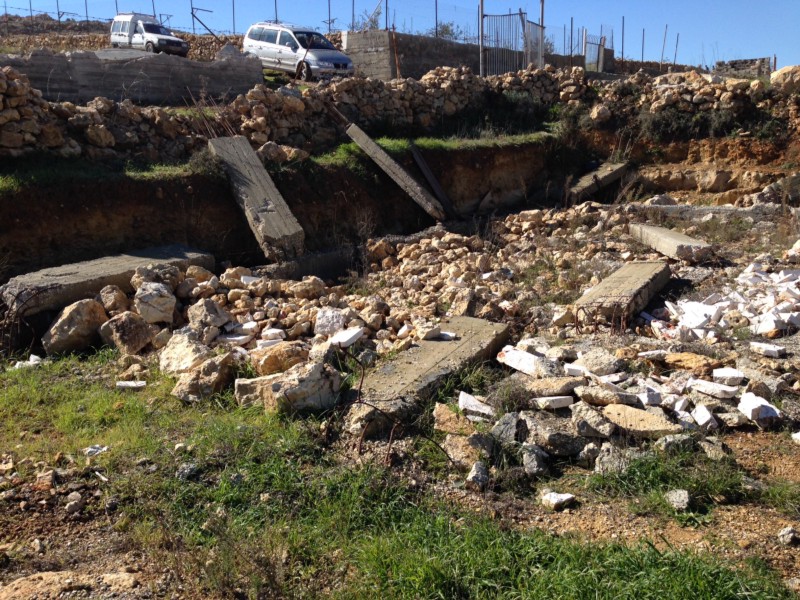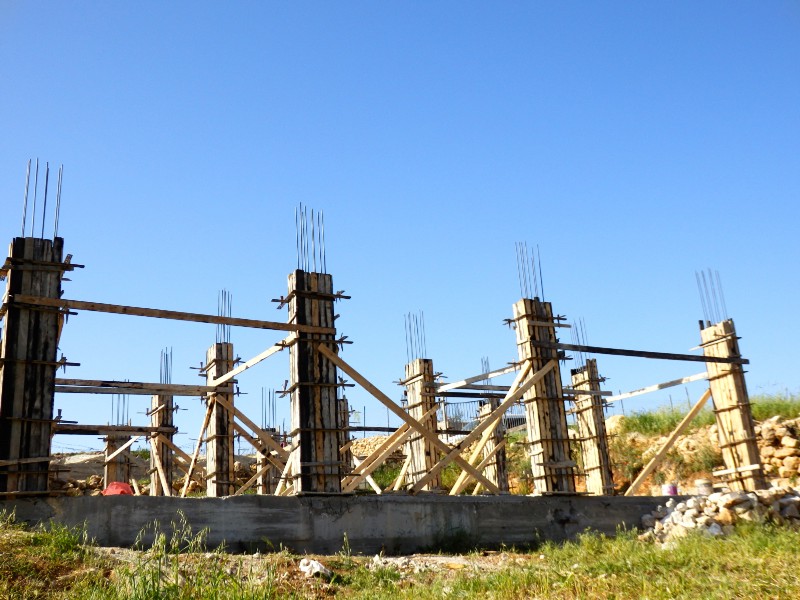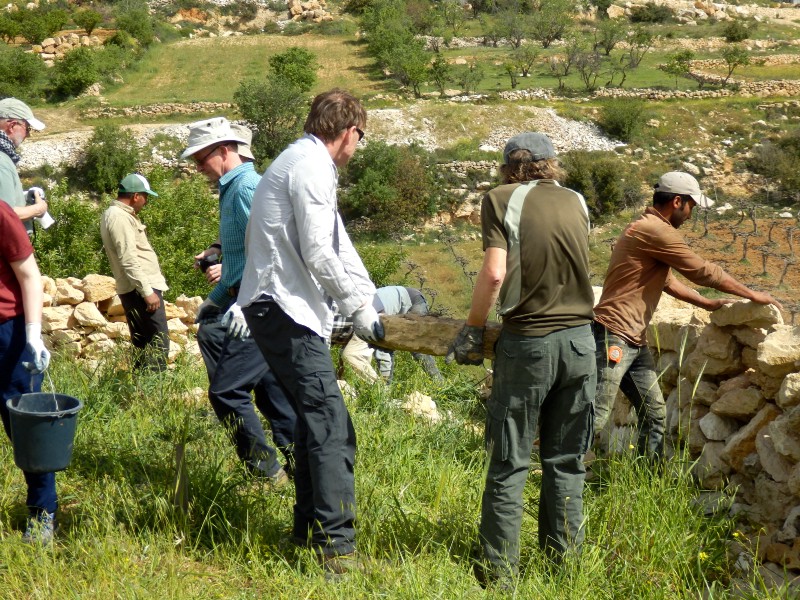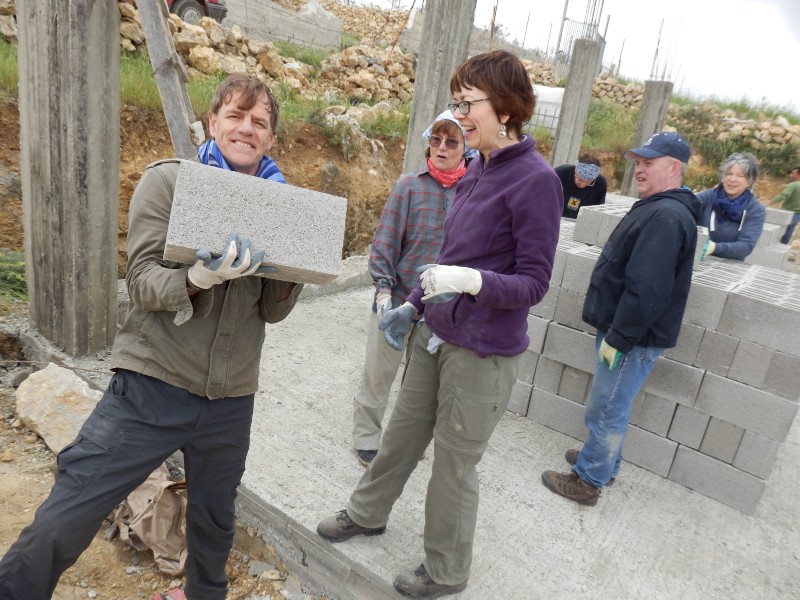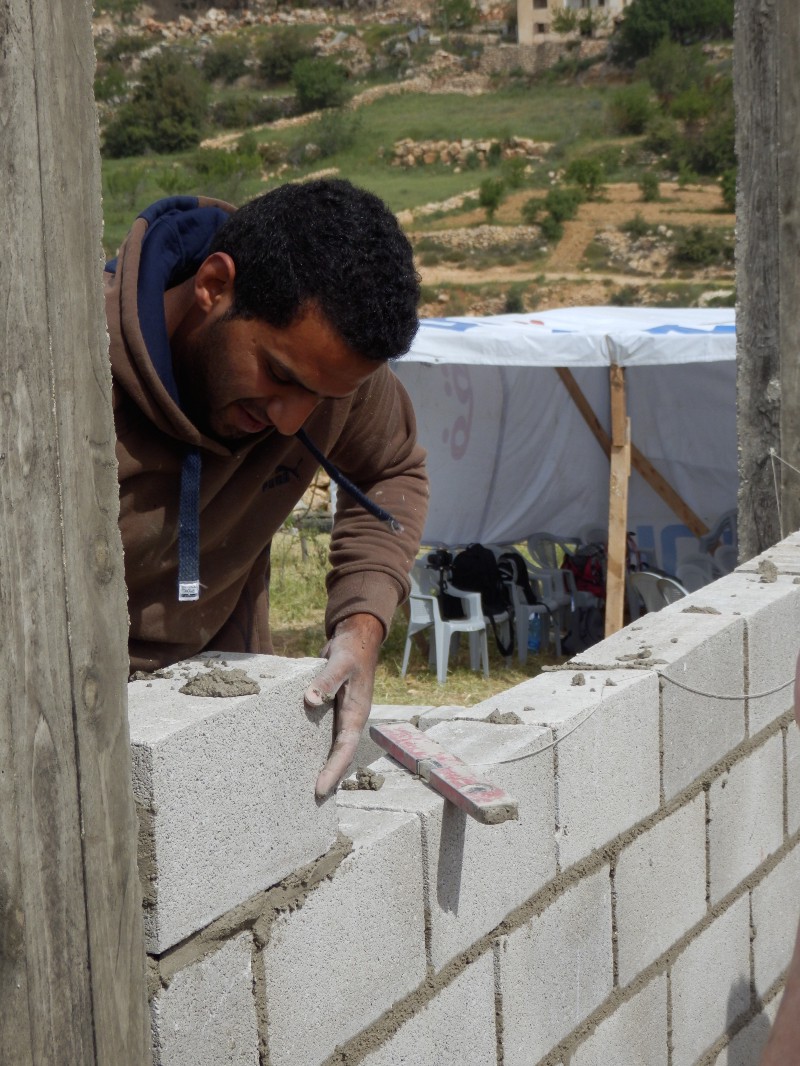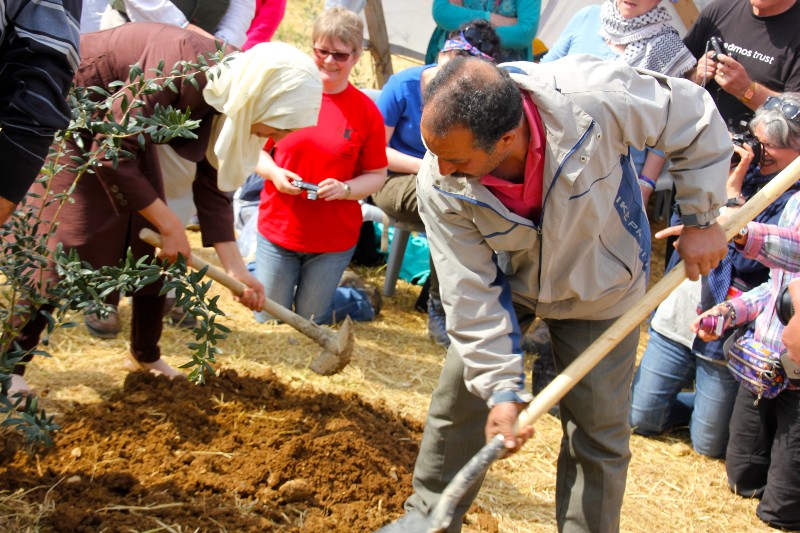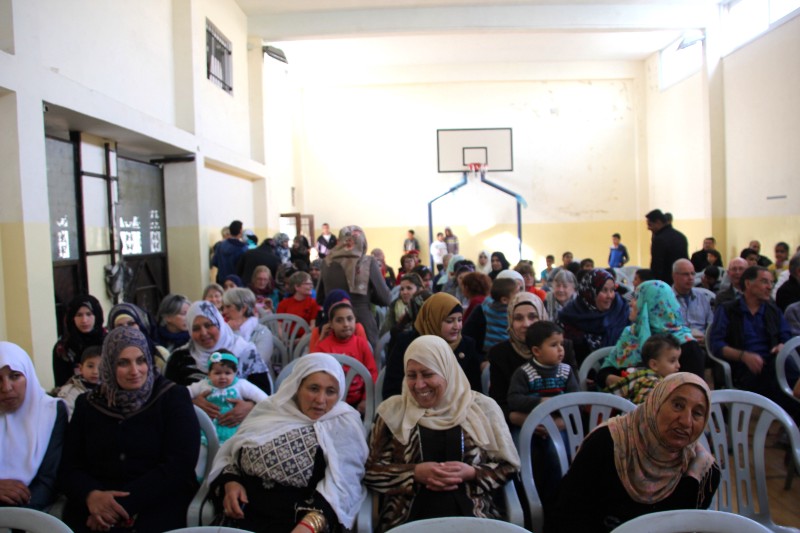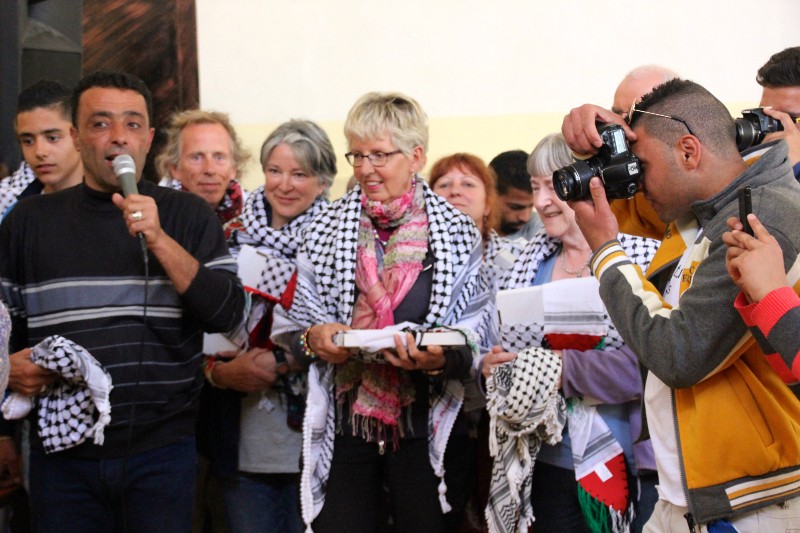A Thousand Bricks of Solidarity
In 2010 a family bought a plot of land.
A simple statement for a not so simple task, as this particular piece of grass and dirt happened to be just outside the Al-Arroub refugee camp, between Bethlehem and Hebron in Palestine. The father and his sons proceeded to build a home on that land, hand mixing every batch of concrete they painstakingly troweled onto cement bricks, until one month later, they had a home.
The father, Yeaqub, was at work one day not long after when a neighbour called. He told Yeaqub the soldiers had come, and they had demolished his brand new home.
Yeaqub stayed at work.
He told our guide later that he didn’t want to see what they had done..
The remains of Yeaqub’s home. (Photo credit: Chris Rose)
When we arrive in Al-Arroub on the 8th of April, Yeaqub, his wife Mariam, and his sons Mohammad and Mutasem all greet us excitedly. Yeaqub and his 7 children have been living in inhumane conditions for years since that day his neighbour called — all sleeping in one room, 4 meters square.
Today, a group of 31 international volunteers have arrived to help them rebuild their home. Led by Chris and Nive, our guides from British based Amos Trust, and Marwan, our local Palestinian guide extraordinaire, we step off the tour vans to welcoming handshakes and 16 pillars standing tall from their brand new place of honour in the freshly poured concrete foundation.
What follows is a dusty look through the viewfinder of 8 beautiful days spent helping this family reclaim their roof.
Wood & steel cables standing strong are what greet us as we arrive..
Along with Yeaqub, his family, and local workers & friends helping the family.
Marwan, our guide, introduces everyone and gets the day started with his special brand of humour and heart, explaining where we are and what we’re doing, and more importantly, what it means. Everyone immediately feels that they are exactly where they need to be.
Marwan
Mariam, the mother, listens to Marwan and is already (visually) overwhelmed.
Mariam
The welcoming speeches draw to a close, and we get to work. First up — building a stone wall on the property perimeter. We glove up and tackle a small mountain of large stones, buddy carrying them to the waiting hands of the local workers who carefully place each rock into position.
MJ & David, one of our LYT volunteers, buddy carrying a massive rock
Martyn interrupts the stacking to suggest a bench be built into the curve of the wall that overlooks the property, and a dozen minutes later, the cement lays drying in the sun.
The artist and his masterpiece
In between lunch and the afternoon’s work, we take an impromptu frisbee break with some of the local kids..
The afternoon task requires two lines of 15 volunteers, passing cement bricks hand to hand chain gang style, from their pile up the drive to various spots within the foundation of the home to prep for tomorrow’s job of laying the bricks into walls.
999 bricks later, we finish for the day as we reach the last one to pile into the house..
Brick # 1,000
Day 2 starts with crowbars and hammers, pulling the wooden planks down from the pillars to reveal the cement underneath. The group is split in various groups, some pulling planks, some yanking nails from the planks once they’ve been removed, others rehammering the nails into shape and collecting them for future use.
(Photo credit: Nive Hall)
Cement is up next, and it will be hand mixed, batch after thick batch.. It is massively heavy, and as arms tire, everyone gives the mixing shovel a try. Even more respect is piled upon our view of Yeaqub and his sons for having done this repeatedly on their own.
The cement gets plopped into the plastic buckets on standby and is carried to various corners of the foundation where bricks are being evenly laid.
Volunteers are everywhere — mixing cement, filling and carrying buckets, prepping bricks to be laid, ‘pointing’ cement via trowel into the cracks between freshly placed bricks, and even brewing the gratefully accepted, never ending supply of perfectly spiced arabic coffee and mint tea..
Lindy ‘pointing’ like a pro.
Lea performing what is easily the most important task — making coffee.
It’s a happy chaos, and as the sun lowers, the walls slowly rise. As we throw in the trowel(!), we survey the day’s work and realise that a thousand bricks have been laid.
It feels good.
Some wet weather slows things down in the days that follow, but eventualy clears and the window frames are poured and preparation for the roof begins..
Steel rods laid, cables tied, bricks aligned
In Palestine, homes are built over years, not days. Money is saved, then spent on bricks, then saved, then spent on cement, etc and as you drive through the villages you see partially constructed homes in every direction. This is one of the reasons it’s so easy for the Israeli military to demolish these homes — there is no one living in them yet and they stand unprotected. The day the roof is poured can take years, and thus, is a day to be celebrated. When the roof is finally laid, it connects the four walls and is officially seen as a ‘home’ in the eyes of the workers & home owners.
The day we poured the roof on Yeaqub’s home in Al-Arroub, our group wrote messages of hope and love on pieces of paper and stuffed them into a piece of tubing that was laid upon the roof bricks. The cement was poured on top of the tubing, sealing in our support of Yeaqub and his family..
It was a beautifully emotional day, and one that I feel confident saying will never be forgotten by 31 people.
With the final corner smoothed, celebrations began, starting with the proud planting of the Palestinian flag in a place of prominence by Yeaqub’s son, Marwan, and two of our group..
A special lunch was served, and various neighbours stopped by to give their congratulations.
Yeaqub waves to our group and some neighbours as the roof pouring begins
The day was brought to a close by an impromptu performance by Martyn around the campfire..
One of Yeaqub’s daughter’s films a quick clip of MJ
With the roof drying in the Middle Eastern sun, the remaining days pass quickly. Window frames are fitted and the final outer wall is laid, leaving only the doorframe. We close out our time with them with a ceremonial planting of an olive tree in their new backyard.
Yeaqub and his family planting the olive tree
With the majority of the outer house in place, the outer rendering and the interior walls, doors and windows will be handled by the family and local workers upon our departure.
There are 31 volunteers on site. Most are from Britain, some from Europe, and a scattered few from North America. While two or three have building experience, the majority of us have absolutely no background in engineering, architecture or cement mixing.
Sure, there is some truth that many hands make lighter work, and four walls and a roof were raised from the ground in 8 days — this is absolutely a nod to our being 40 strong on the work site. Our group has also raised funding to be there, and that was also beneficial, as it went toward purchasing building supplies and paying the local workers.
More importantly — most importantly — however, is what our presence represents. We have traveled from Britain, Europe, North America, through the West Bank, and here to Al-Arroub, to stand beside them and show our support. Our being on that work site says you are not forgotten. You are not voiceless. We see that you have suffered a great injustice, and we want to come stand beside you to right this wrong. We will come, we will see, we will hear your stories. We will go home and tell our family, our friends.
Yeaqub and his family, his wife, children, his neighbours, they look around and see their house being built by a group of people from all over the world. They thank us constantly, and their hospitality and warmth overwhelm us. Our guides tell us they thank us for being there because to them it means that someone cares.. It tells them they are not alone. We carry bricks and stones in solidarity.
On our final day, the entire town of Al-Arroub streams into the local community centre for the closing ceremony. We are showered with gifts — beautifully embroidered scarves, hand painted ceramic plates. Martyn brings all 31 volunteers up as his backing band and they serenade the audience in “We Shall Overcome”, and the wall seems to pulse with celebration.
There are many speeches- by Marwan, our guide, by local dignitaries, and by our guides from Amos Trust.
It is during one such speech that Nive, our guide from Amos says he is a lucky man. He has two homes now, one in Britain, and one in Al-Arroub. He tells Yeaqub that if the soldiers come and knock his home in Al-Arroub down that we will all come back and build it again, brick by brick.
Every volunteer nods their head in agreement.
Yeaqub, Mariam, and 5 of their children

